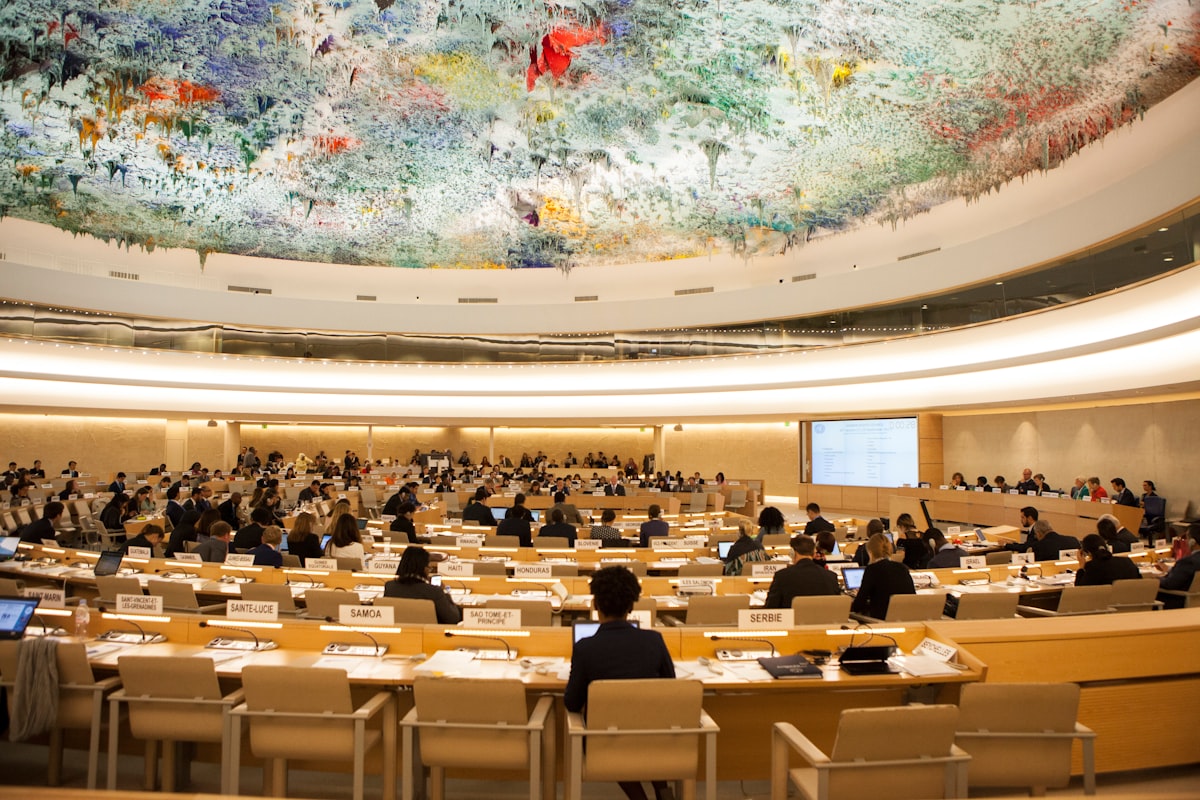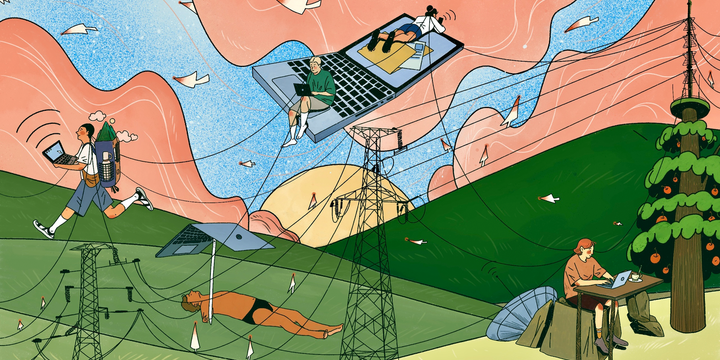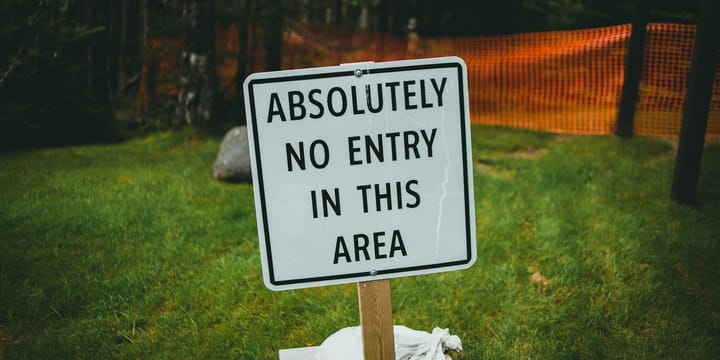10 ways the internet makes things worse for human rights

The internet has facilitated a new era of challenges and threats to human rights. While it has enabled e-commerce, it has exacerbated inequality. While it has democratized freedom of expression, it has given a megaphone to hate speech. While it has lowered barriers to access information, it has proliferated misinformation. Social movements are online but not in the streets. Governments have privatized surveillance at previously unimaginable scale.
In my 15 years working in tech as a human rights activist, I have never read nor written an opening paragraph like the one you just read.
In the field of internet governance, a pessimist is someone who believes the internet is neutral.
For decades there has existed dogmatic belief in the global, open internet as an inherent force for good, despite a growing mountain of evidence that our health, the economy, society, and the environment are all in decline.
This article prompts some hard – and potentially vulnerable – questions. What if our optimism delays our ability to respond to problems before they hit scale? What if our happy consensus that the internet is inherently good keeps us working on easy technical problems instead of messy human ones? What if an honest analysis uncovers that the internet isn’t good, or even neutral, but actually a net-negative for human rights?
Here are ten ways the internet has made things worse for human rights. I’m not saying we should disconnect it! I am your unironic uber-tech-optimist who actually thinks this situation is reversible, but first we have to fully confront it. My next piece will be the ten things we can do about it.
1 The erosion of privacy
With the proliferation of social media platforms, online shopping, and digital communication, individuals now share vast amounts of personal information online. This has made it easier for governments and corporations to collect and analyze data, often without the informed consent of individuals. The dominant corporate business model has led to a loss of control at the planetary scale over personal data, as individuals' information is often harvested and monetized by corporations. This raises concerns about the misuse of data for advertising, manipulation, and the erosion of individual autonomy. Human rights, more broadly, are also affected, including the right to free expression and political opinion, and according to Freedom House have all been on the decline worldwide.
The revelations of mass surveillance programs like PRISM, exposed by Edward Snowden in 2013, highlighted the extent to which governments can infringe upon citizens' privacy rights in the digital age with the complicity of corporations. While changes to the internet’s security architecture have responded, users feel– and are– more targeted and surveyed than ever before.
2 State surveillance, state violence
The internet has facilitated the growth of surveillance states, where governments monitor citizens' online activities, often without proper oversight or accountability. This mass surveillance can have a chilling effect on freedom of expression, as individuals may self-censor their online behavior out of fear of government scrutiny. In autocracies, internet surveillance has been used to target activists, journalists, and political dissidents, leading to human rights abuses. The internet is now ubiquitous and essential for information, banking, health and personal communications, so when governments shut down internet access as a means of quelling dissent and limiting the spread of information during times of political unrest or protest, that’s a new form of abuse of state power. These shutdowns violate individuals' rights to access information and communicate freely, and they can have dire consequences in emergency situations when access to information is critical. From militarization to policing, technology only enhances state power.
The Israeli military firm NSO Group provides governments with technology that enhances the state’s control of information and individuals. Its weapons-grade spyware is controlled through export and acquisition by democratic countries, however autocratic regimes remain avid buyers of NSO Group cyber-weapons that have been used to track and murder human rights activists and journalists in various countries.
3 Intimate partner violence, bullying, stalking and harassment
The anonymity and distance provided by the internet have enabled the rise of cyberbullying and online harassment. Social media platforms, in particular, have become breeding grounds for abusive behavior. Victims of cyberbullying and online harassment often suffer significant emotional and psychological distress, and the online nature of these attacks can make it challenging for authorities to hold perpetrators accountable. Online platforms have been criticized for their role in facilitating human rights abuses. Social media companies, for example, have faced scrutiny for not doing enough to combat hate speech, harassment, and the spread of extremist content on their platforms. The profit-driven nature of many online platforms can lead to a focus on engagement at the expense of user safety and well-being. Importantly, physical, real-world harms are also exacerbated by technology.
Women have filed police reports across the United States saying they have found tracking devices in their cars or in personal belongings and who, most importantly, feared physical violence. These cases illustrate the degree to which the abuse vector from people who are known to victims is amplified by technology implemented with physical access.
4 Misinformation and manipulation
The internet has become a powerful tool for the spread of disinformation and misinformation. False information can be disseminated rapidly, leading to real-world consequences. This has implications for human rights, as misinformation can be used to manipulate public opinion, incite violence, or erode trust in democratic institutions. Efforts to combat misinformation often raise questions about censorship and freedom of expression. Extremist ideologies and hate groups have found fertile ground on the internet, where they can recruit, radicalize, and coordinate activities with relative ease. The internet has played a role in the viral spread of radicalizing content that stokes terrorism and hate crimes, posing significant threats to the safety and security of individuals and communities, all at scale.
When George Floyd was killed by police in 2020, protests surged around the United States and online mentions skyrocketed. In the context of a global pandemic and deep political divisions, some of which centred on race, misinformation flourished. The combination of rapid reporting of live events and a captivated audience created ideal conditions to be exploited by far-right forces who sowed doubt, uncertainty and fear about the nature of the protests and the progressive agenda towards racial equity.
5 Inequality and exclusion
While the internet has the potential to empower individuals by providing access to information and opportunities, a digital divide persists. Many people around the world lack reliable internet access or digital literacy skills, leaving them at a disadvantage in an increasingly digital society. The digital divide exacerbates existing inequalities, limiting access to education, healthcare, and economic opportunities.
Governments around the world have been actively working on digital transformation, which involves providing services online, and in some cases resulting in the complete closure of physical government offices, downsizing of agencies, or bureau restructuring– essentially austerity measures. For citizens with limited means, they may no longer be able to complete their paperwork, or work through difficult corner cases, loss or theft, with the help of a civil servant. It is also often those same citizens who do not have internet or smartphone access. For these people, digitalisation is a form of double disenfranchisement. This means that more than one divide is emerging: Offline access is disappearing at the same time that the digital divide persists.
6 Shrinking civic space
The internet has eroded offline civic space, introducing several challenges and negative impacts on the right to protest. Amnesty International reports, “Protesters across the globe are facing a potent mix of pushbacks, with a growing number of laws and other measures to restrict the right to protest; the misuse of force, the expansion of unlawful mass and targeted surveillance; internet shutdowns and online censorship; and abuse and stigmatization.”
Civic action is more easily censored and deplatformed as most “online space” is private, not public. Governments and law enforcement agencies often monitor online platforms and social media, often in full cooperation with companies, to track the activities of activists and protest organizers. This surveillance can have a chilling effect on individuals' willingness to participate in protests, as they fear retaliation or prosecution. Some actually face it. Alaa Abdel Fattah, a digital rights activist, has been in prison since Egypt’s revolution in 2013. Facial recognition, drones, IMSI catchers and other tools infringe on protesters' privacy and limit their ability to demonstrate anonymously.
7 Overconsumption and materialism
Overconsumption is closely linked to socioeconomic disparities. In a world where a significant portion of the population struggles to access basic necessities like clean water, food, and healthcare, the overconsumption of resources by more affluent individuals and countries can be seen as a violation of the right to an adequate standard of living. Overconsumption not only exacerbates global inequalities but also diverts resources away from addressing pressing human rights issues. The internet has transformed the way we shop and consume goods and services. E-commerce platforms, online advertising, and targeted marketing have made it easier than ever for consumers to make purchases frictionlessly and in the moment: on impulse. Corporates are better able to nudge consumers to buy bigger, more and more often. This culture of consumerism, driven by the convenience of online shopping and constant exposure to advertisements, has led to overconsumption and the excessive production of goods. Overconsumption hurts individuals’ economic stability, but excessive production is also a drag on the larger economy and leads to inflation and waste.
8 Environmental decline
Increased consumption and production of networked devices and hardware places enormous stress on the environment, contributing to issues like deforestation, pollution, harmful emissions, waste and climate change. The rapid turnover of electronic devices, driven by technological advancements and planned obsolescence, has led to a surge in electronic waste. This e-waste often ends up in developing countries, where the handling of e-waste, which often contains hazardous materials, can lead to health problems and labor rights abuses for those involved in its inadequate recycling and disposal practices. This, as well as mining for the rare minerals used in electronic devices can harm local communities and ecosystems. Energy and water consumption used to power and cool data centers depletes natural resources, entrenches society’s reliance on fossil fuels, and emits carbon dioxide on a scale that has led to the entire planet’s warming. Where climate change’s impact on marginalized communities and underdeveloped countries is greater, there is an amplification factor: the harms related to livelihoods and finance, socio-political conditions, food security, health, water supply, habitat and migration are exacerbated by the effects of climate change.
While the UN Seabed Authority stewards and protects the ocean floor for the world’s common heritage, the bottom of the sea is just much too valuable a source of precious metals for corporates to leave alone. And while negotiations to open the seabed for mining have given priority to developing countries, the largest multinationals have partnered with small island nations in their project bids. What they’re after: rare metals and minerals that go into our electronics, especially batteries.
9 Cultural hegemony and homogenization
The dimensions of difference impact and shape our contemporary social landscapes. It is largely accepted that various forms of diversity in representation, such as race, gender, and ethnicity, intersect and shape culture and politics. Power structures and social hierarchies depend upon representation and marginalized groups depend upon visibility to negotiate their identities within the broader societal framework. Homogenization happens when small, localized cultures become less practiced and less visible than large, global cultures– this has been hastened by both globalisation and the internet.
The interactive “State of the Internet’s Languages” report by Whose Knowledge? maps the way languages are underrepresented in online communities. It is only when one pays attention to the quality of information sharing online that one might see that a queer, visually impaired woman in Bangladesh would have a difficult time accessing online communities or content that helps her explore her sexual interests. Perhaps counterintuitively, genuine subculture does not thrive online as it can offline.
10 Labour and the right to work
Digitalisation is the latest efficiency and austerity effort, first imagined and begun in the 1890s with the filing cabinet as a way to mold information for optimisation. In the decades between vertical efficiency and artificial intelligence, commerce has developed two beliefs simultaneously: that sufficient information produces knowledge and that surpassing human capability is the same as improving upon human capability. Unlike mechanization that replaced manual labor, digitalization has accelerated the peeling away of knowledge workers. Digital platforms have restructured employee-employer relationships to be more flexible for markets but more precarious for workers. A more decentralized workforce will struggle to build solidarity and unionize. Employers adeptly skirt regulations and collective bargaining with a global labor market.
Automation within labor management is incredibly bleak. Hiring algorithms reject candidates who have attended all-women’s colleges. Worker surveillance and monitoring are embedded by employers in the digital tools that their employees must use to do their jobs, violating the right to privacy. Low wage and marginalized workers are more likely to consider on-the-job technology adversarial rather than facilitative.
In conclusion, the erosion of privacy, civic space, cultural fabrics, accountable institutions, the environment and economic equality are problems that each deserve their own course correction. That we are facing them together, along with others not elaborated here, and simultaneously, requires an enormous amount of attention and effort. Constant negativity feels repetitive, demoralizes activists and causes collective anxiety.
To make matters even worse, we are often presented with thought leadership that over simplifies problems and presents magical solutions. That these are often well received is indicative that magical thinking is a collective avoidance tactic. Einstein reminds us that you can’t solve tech with more tech, and when tech feels like the only thing we as a species have gotten right lately we tend to overlook the human rights issues as merely sub-optimal.
Instead what is needed is a managerial approach that balances progress with human rights protections. It also requires restraint. To achieve this balanced approach, we must first cultivate acceptance of our complex and evolving challenges. From there, only a fully apprised vigilance from governments, corporations, and civil society can take into careful consideration radical actions upon a proliferation of efforts directed at every level.
So in an effort to confront the ways in which the internet has had negative consequences for human rights, I’ve had the unfortunate realization that the prevailing notion that the internet is inherently good for human rights is, in fact, incorrect. The conclusion is not less internet. It’s better internet for more people, but we have to actually make that happen, together.




Comments ()